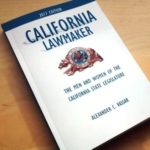According the Notice to Candidates, issued by the Secretary of State on March 26, there will be 13 candidates for partisan office running unopposed in the June Primary. It’s important to remember that additional candidates may appear when the official list of candidates is released early next week, and that candidates can still qualify for […]
NEW BOOK: California Lawmaker 2021
From confrontations in the tense years before the Civil War to the recent work to help the state through the ongoing COVID-19 pandemic, California’s legislature and the people who have served in it have an amazing and rich history. Updated through the start of the legislature’s 94th session (2021-22 Regular Session), “California Lawmaker” is a […]
NEW BOOK: Freedom by State Senator Nelson S. Dilworth
New available on Amazon.com is Freedom: Reflections on What Makes America Great from a Veteran of World War I by State Senator Nelson S. Dilworth. Dilworth had a varied career, including time as a rancher, a newspaper publisher, and lawmaker. After serving as the publisher of the Coachella Valley News, Dilworth enlisted in the U.S. Army […]
- « Previous Page
- 1
- 2
- 3
- 4
- …
- 84
- Next Page »
